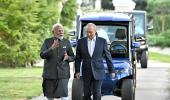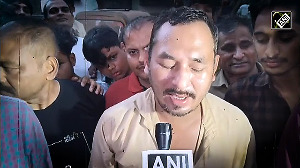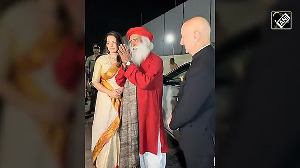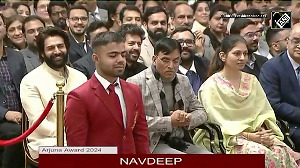India on Tuesday said cooperation in peaceful uses of nuclear technology is an important pillar of the multifaceted cooperation with Russia, which offered help in building small tropical nuclear power stations.

An India-Russia joint statement after the conclusion of talks between Prime Minister Narendra Modi and Russian President Vladimir Putin noted the importance of cooperation in the peaceful uses of nuclear energy as a significant component of the strategic partnership.
"Russia offers cooperation in building small tropical nuclear power stations to India with the possibility of their deep localisation, including transfer of the construction part to New Delhi," Chief Executive Officer of the state-run corporation Rosatom Alexey Likhachev said as he conducted a tour for Modi and Putin in the Atom Pavilion.
"We offer cooperation possibilities for construction of tropical stations ... with very deep localisation. We can transfer the whole construction part to you," the CEO told Modi as he visited the Rosatom Pavilion at the All Russian Exhibition Centre, VDNKh in Moscow.
Inaugurated in November 2023, VDNKh is one of the largest exhibitions in the history of scientific and technological developments.
Modi also witnessed a photo exhibition dedicated to India-Russia cooperation in the field of civil nuclear energy.
'Visited the Atom Pavilion with President Putin. Energy is an important pillar of cooperation between India and Russia and we are eager to further cement ties in this sector,' Modi posted on his official X platform along with the photographs from the visit.
'Prime Minister Modi was also shown the 'Atomic Symphony' -- a permanent working model of the VVER-1000 reactor, which is the heart of the Kudankulam Nuclear Power Plant (KKNPP) in India,' a statement from the Ministry of External Affairs (MEA) said.
Modi was in Moscow to hold the 22nd India-Russia annual summit with President Putin.
Russia and India are collaborating on building six 1,000 MW nuclear reactors in Kudankulam. Power units No. 1 and No. 2 of the Kudankulam Nuclear Power Plant (NPP), being constructed with Russia's help since 1998, have already been commissioned.
"The construction of power units No. 3, No. 4, No. 5 and No. 6 is also underway. The plan is to complete the construction fully by 2027. The Indian Ministry of External Affairs has stated additional facilities search. In December 2021, New Delhi also promised to provide an area for construction of the second Russia-designed NPP," state-run news agency TASS said.
The joint statement issued at the end of Modi's two-day visit, under the 'Civil Nuclear Cooperation, Cooperation in Space' said the two sides welcomed the progress achieved in the construction of the remaining nuclear power plant units at Kudankulam and agreed on adhering to the schedule, including to the timelines for delivery of supplies.
Both sides noted the importance of further discussion on the second site in India in accordance with earlier signed agreements, it said, adding, 'They agreed to continue technical discussions on the VVER 1200 of the Russian design, localisation of equipment and joint manufacturing of NPP components as well as on cooperation in third countries.'
The two sides also confirmed their intention to broaden cooperation in Nuclear Power including fuel cycle, life cycle support for operating KKNPPs and non-power applications.
The MEA statement also said: 'At the Pavilion, the Prime Minister interacted with a group of Indian and Russian students. He encouraged them to look at future possibilities in the realm of science and technology, which could be harnessed for the benefit of future generations and for the planet.'
'Cooperation in peaceful uses of nuclear technology is an important pillar of the multifaceted cooperation between India & Russia,' the MEA posted on X soon after the visit.
Likhachev also said that Rosatom wants to develop 4G nuclear technologies in India.
"We are currently developing the agenda of further cooperation. As we have tested each other and constructed very efficient relations in the present generation, the so-called 3+, we would like to move toward the fourth generation together," he said.
TASS said quoting him from an interview with the Rossiya-24 TV news channel that 'those (the fourth generation) are fast reactors, fast-neutron reactors, there is further modification and development of our VVER technologies, water-water reactors, there is fuel cycle closure, as well as such groundwork areas as thermo-nuke and quantum technology'.
Earlier on May 23, Department of Atomic Energy secretary Ajit Kumar Mohanty met with Likhachev and discussed ways to further bolster the nuclear energy cooperation between the two countries.
The two sides had visited the site of the Pilot Demonstration Energy Complex (PDEC) being built in Seversk, Tomsk region in Russia when a full-scale discussion took place on the prospective areas of the Russian-Indian cooperation in the nuclear field, a Rosatom statement had said then.
A week before that External Affairs Minister S Jaishankar had said India is looking for additional sites for Russian nuclear reactors.
Meanwhile, the joint statement also noted the importance of cooperation in Space, and said the two sides welcomed the enhanced partnership between the Indian Space Research Organisation (ISRO) and the Russian State Space Corporation 'Roscosmos' in the use of outer space for peaceful purposes, including in the human spaceflight programmes, satellite navigation and planetary exploration.
The Russian side also congratulated India on the successful landing of Chandrayaan-3 as a long stride in the exploration of outer space and the impressive progress made by India in science and engineering, which can be mutually beneficial for future cooperation.
'The two sides agreed to explore prospects of mutually beneficial cooperation in rocket engine development, production and use,' the statement added.











 © 2025
© 2025